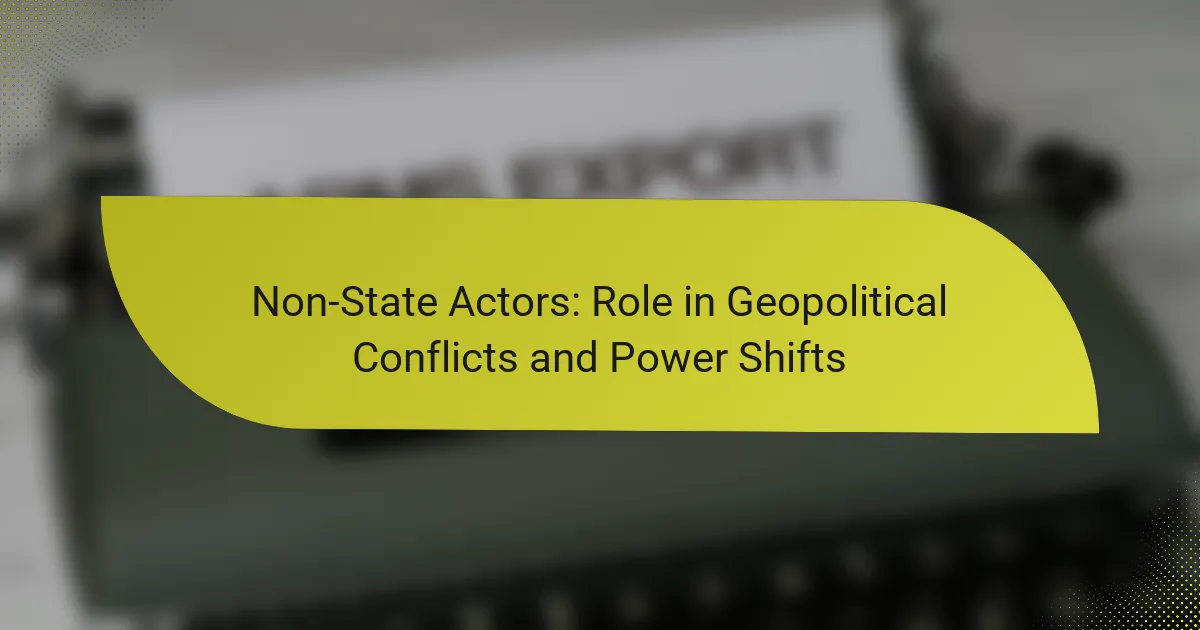Non-state actors play a crucial role in geopolitical conflicts by challenging the authority of traditional state powers and influencing outcomes through diverse means. These entities, ranging from terrorist organizations to multinational corporations, operate independently of national governments, thereby reshaping both local and global dynamics. Their involvement often leads to significant shifts in political power, social structures, and international relations.
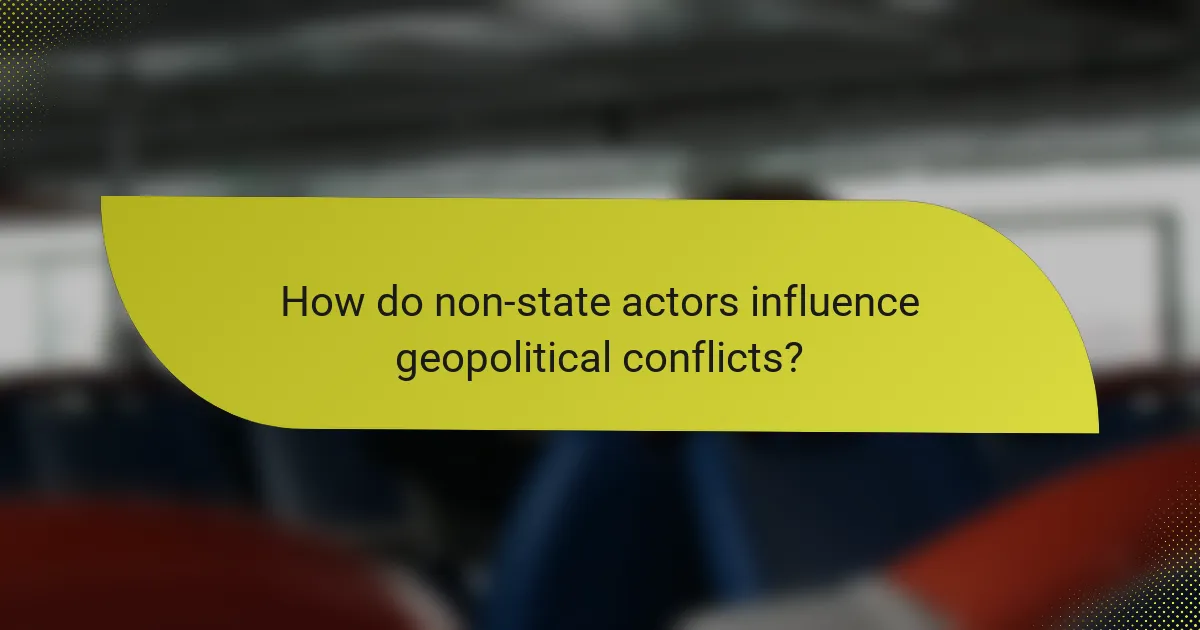
How do non-state actors influence geopolitical conflicts?
Non-state actors significantly influence geopolitical conflicts by challenging traditional state power and shaping outcomes through various means. These entities, which include terrorist organizations, NGOs, and multinational corporations, often operate outside the bounds of national governments, impacting both local and global dynamics.
Influence through asymmetric warfare
Non-state actors frequently engage in asymmetric warfare, leveraging unconventional tactics to counter stronger state forces. This can include guerrilla tactics, cyber warfare, and terrorism, which allow these groups to inflict damage and create instability without the need for conventional military strength.
For example, groups like ISIS and the Taliban have utilized asymmetric strategies to gain territory and influence, often exploiting local grievances and weaknesses in state responses. This approach can lead to prolonged conflicts and complicate traditional military strategies.
Impact on international diplomacy
Non-state actors can alter the landscape of international diplomacy by acting as key stakeholders in conflicts. Their involvement can shift negotiations and influence the priorities of state actors, as governments may seek to engage with these groups to achieve peace or stability.
For instance, humanitarian organizations often play a crucial role in mediating between conflicting parties, while armed groups may demand recognition or concessions in diplomatic talks. This can lead to complex negotiations where the interests of non-state actors must be considered alongside those of sovereign states.
Role in humanitarian crises
During humanitarian crises, non-state actors often step in to provide essential services and aid where governments may fail. NGOs and international organizations frequently mobilize resources to address immediate needs, such as food, shelter, and medical care, especially in conflict zones.
These actors can sometimes fill gaps left by state responses, but their involvement can also complicate the situation. For example, the presence of armed groups can hinder aid delivery, while differing agendas among various organizations may lead to inefficiencies. Coordination among these entities is crucial for effective crisis management.
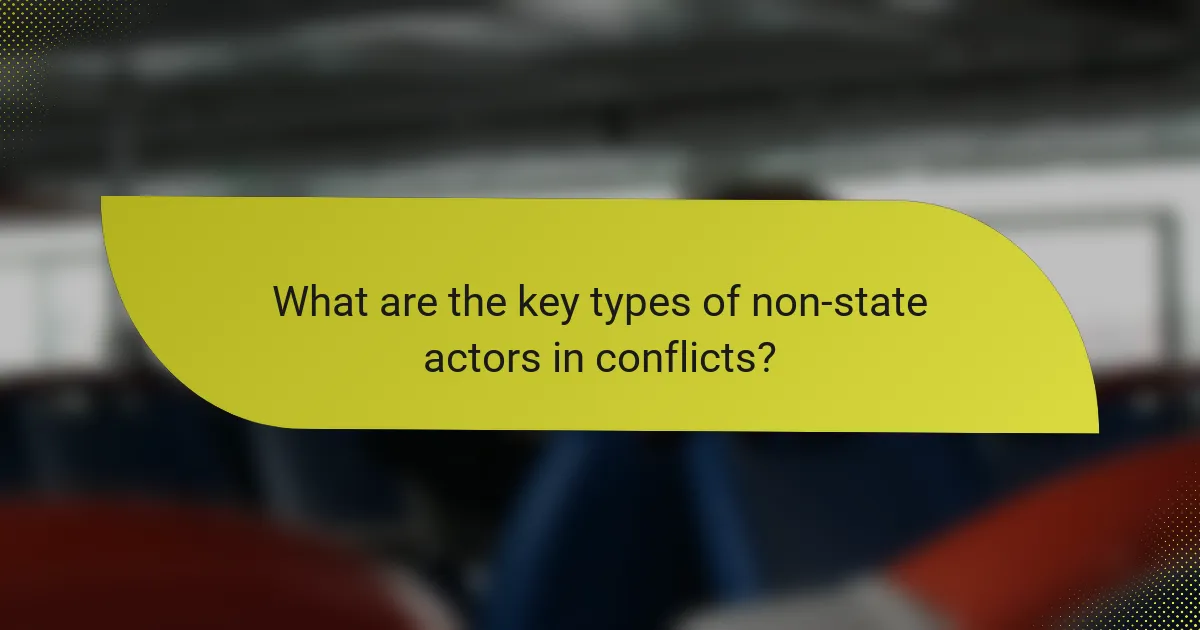
What are the key types of non-state actors in conflicts?
Non-state actors in conflicts include various entities that operate independently of state control, significantly influencing geopolitical dynamics. Key types include terrorist organizations, militant groups, and transnational corporations, each playing distinct roles in shaping power shifts and conflict outcomes.
Terrorist organizations like ISIS
Terrorist organizations such as ISIS leverage violence and fear to achieve political goals, often operating across national borders. They recruit members globally, using propaganda to spread their ideology and attract support, which complicates international security efforts.
ISIS, for instance, has utilized social media to disseminate its message, allowing it to reach potential recruits in various countries. This global reach poses challenges for governments, as they must address both domestic and international threats stemming from such groups.
Militant groups such as Hezbollah
Militant groups like Hezbollah often operate with a combination of military and political strategies, influencing regional conflicts and power dynamics. Based in Lebanon, Hezbollah has established a significant presence in the Middle East, engaging in both armed conflict and political participation.
Hezbollah’s dual role allows it to gain local support while challenging state authority, which can lead to complex interactions with other non-state actors and state entities. Understanding their motivations and strategies is crucial for addressing the conflicts they are involved in.
Transnational corporations like ExxonMobil
Transnational corporations such as ExxonMobil wield considerable influence in geopolitical conflicts through their economic power and resource control. These companies often engage in lobbying and partnerships with governments, impacting policy decisions and regional stability.
For example, ExxonMobil’s investments in oil-rich regions can lead to tensions over resource allocation and environmental concerns, affecting local communities and international relations. Stakeholders must navigate the implications of corporate actions in conflict zones, recognizing the potential for both economic development and conflict escalation.
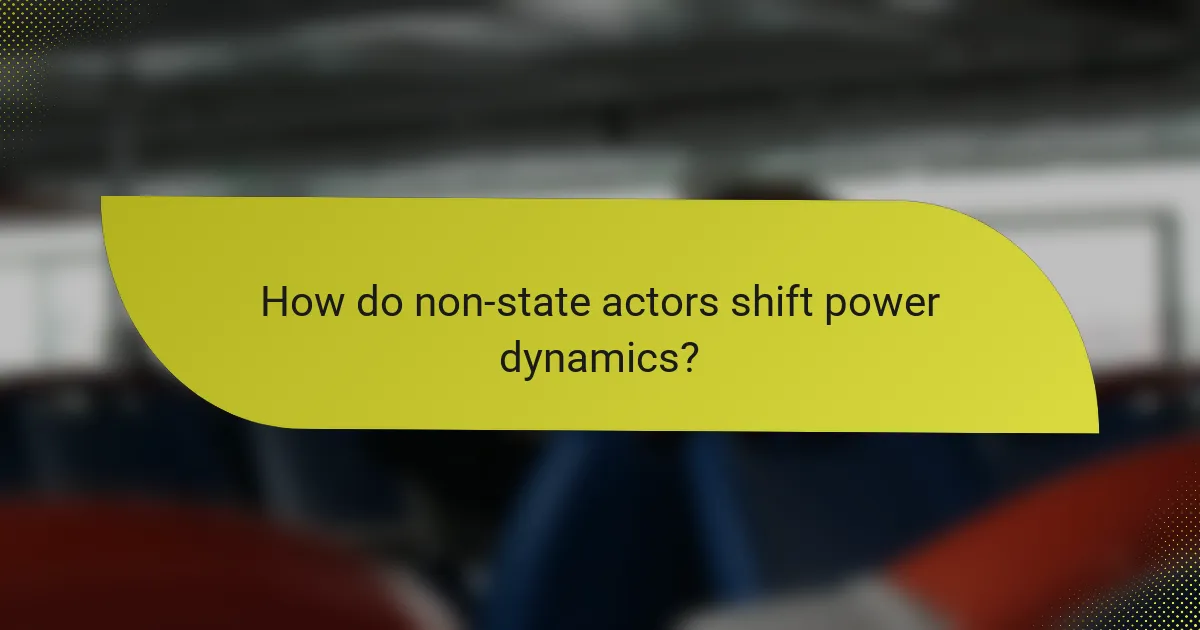
How do non-state actors shift power dynamics?
Non-state actors can significantly alter power dynamics by challenging traditional state authority, creating alternative governance frameworks, and shaping public perception through media influence. Their actions often lead to shifts in political power, social structures, and international relations.
Challenging state sovereignty
Non-state actors, such as multinational corporations, terrorist organizations, and NGOs, can undermine state sovereignty by operating independently of government control. For instance, armed groups may exert control over territories, challenging the state’s monopoly on violence and law enforcement.
This challenge can lead to fragmented governance, where states struggle to maintain authority. In some regions, non-state actors may even provide essential services, further complicating the state’s role and legitimacy.
Creating alternative governance structures
Non-state actors often establish alternative governance structures that can rival or supplement state functions. For example, in conflict zones, local militias may create their own systems of law and order, which can be more effective than the existing state apparatus.
These alternative structures can include community-based organizations or international NGOs that provide education, healthcare, and security. Such initiatives can empower local populations but may also lead to competition with state institutions for legitimacy and resources.
Influencing public opinion through media
Non-state actors leverage media platforms to shape public opinion and mobilize support for their causes. Social media, in particular, allows these actors to disseminate information rapidly, bypassing traditional state-controlled narratives.
By crafting compelling messages and engaging with audiences directly, non-state actors can sway public sentiment and influence political agendas. This can be seen in various movements worldwide, where grassroots campaigns effectively challenge established political norms and policies.
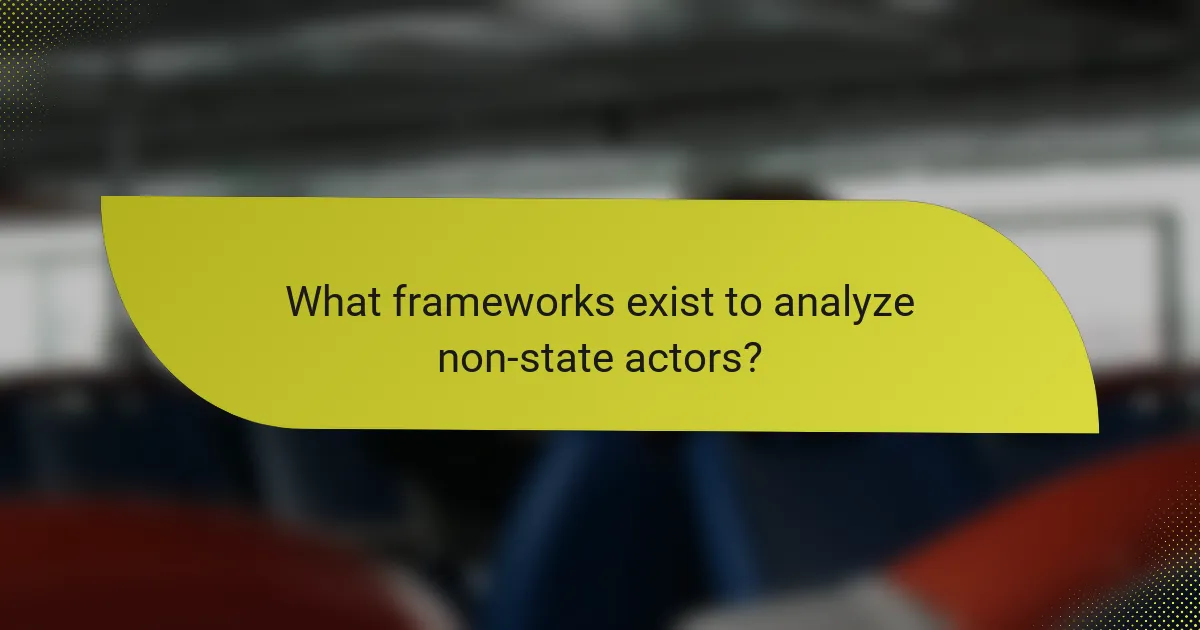
What frameworks exist to analyze non-state actors?
Several frameworks exist to analyze non-state actors, focusing on their roles in geopolitical conflicts and power dynamics. These frameworks help in understanding how these entities influence state behavior and international relations.
Conflict analysis frameworks
Conflict analysis frameworks provide structured approaches to understanding the complexities of conflicts involving non-state actors. These frameworks often include tools like stakeholder mapping, which identifies key players and their interests, and conflict tree analysis, which visualizes the causes and effects of conflict.
One common approach is the “Do No Harm” framework, which emphasizes minimizing negative impacts on communities during conflict interventions. Practitioners can use these frameworks to assess the influence of non-state actors, such as NGOs or militant groups, in various contexts.
International relations theories
International relations theories, such as realism, liberalism, and constructivism, offer insights into the behavior and significance of non-state actors. Realism focuses on power dynamics and often views non-state actors as secondary to state interests, while liberalism acknowledges their role in promoting cooperation and global governance.
Constructivism, on the other hand, emphasizes the social constructs that shape the identities and actions of non-state actors. Understanding these theories helps analysts evaluate how non-state actors can affect state sovereignty and international norms, particularly in regions experiencing instability.
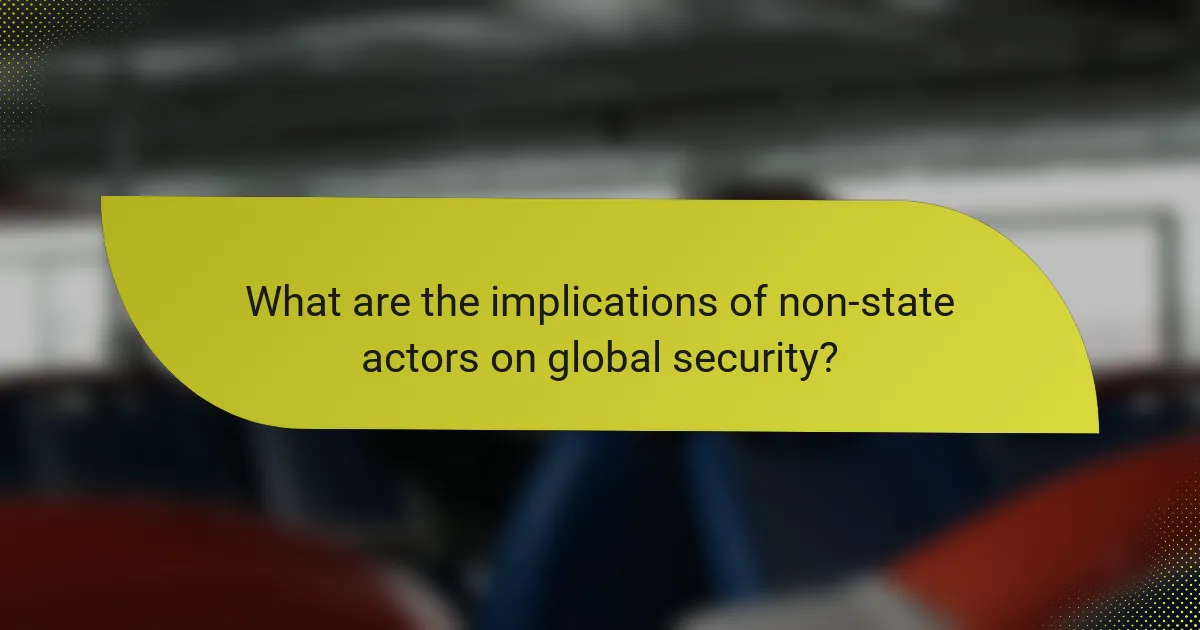
What are the implications of non-state actors on global security?
Non-state actors significantly impact global security by introducing new dynamics in conflicts and power structures. Their influence can lead to increased instability and challenge traditional state-centric security frameworks.
Increased unpredictability in conflicts
Non-state actors, such as terrorist organizations and insurgent groups, contribute to heightened unpredictability in geopolitical conflicts. Their decentralized nature allows them to operate outside the control of state authorities, making their actions less predictable and often more violent.
For example, groups like ISIS have demonstrated the ability to rapidly gain territory and influence, creating sudden shifts in regional power dynamics. This unpredictability complicates conflict resolution and can lead to prolonged instability in affected areas.
Challenges for state-led security measures
The presence of non-state actors poses significant challenges to state-led security measures. Traditional military and law enforcement strategies may not effectively address the asymmetric tactics employed by these groups, such as guerrilla warfare or cyber attacks.
States often struggle to adapt their security frameworks to counter non-state threats, leading to gaps in response capabilities. For instance, the rise of cyberterrorism has outpaced many governments’ ability to safeguard critical infrastructure, highlighting the need for innovative approaches to security that incorporate non-state dynamics.
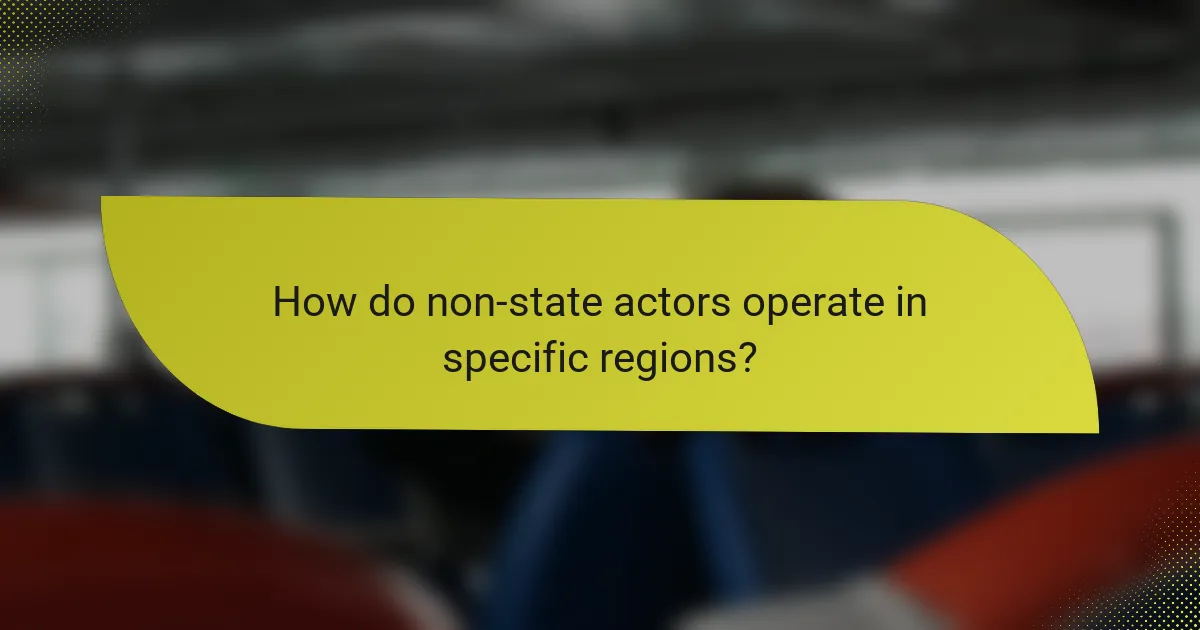
How do non-state actors operate in specific regions?
Non-state actors operate in specific regions by influencing political, social, and economic landscapes without being tied to a government. They often fill power vacuums, provide services, or engage in conflict, leveraging local grievances and dynamics to achieve their objectives.
Middle East dynamics with non-state actors
The Middle East is a complex arena where non-state actors, such as militant groups, NGOs, and transnational corporations, play significant roles. These entities often emerge in response to state weaknesses, engaging in activities that range from armed conflict to humanitarian aid.
For instance, groups like Hezbollah and ISIS have shaped regional conflicts by exploiting sectarian divisions and political instability. Their operations can lead to shifts in power dynamics, often complicating international relations and local governance.
When analyzing non-state actors in the Middle East, consider their funding sources, recruitment strategies, and alliances. Understanding these factors can provide insights into their influence and the potential for conflict resolution or escalation.
